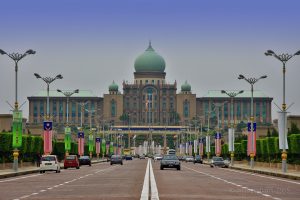Malaysia’s embattled Prime Minister Muhyiddin Yassin has succeeded in extending his short term in office – at least for now – after the United Malays National Organization (UMNO) agreed to continue backing his shaky coalition government.
The decision came after a marathon meeting of the UMNO Supreme Council that stretched into the early hours of October 27, in which the party opted to continue propping up the Perikatan Nasional (PN) coalition.
The meeting was prompted by the king’s October 25 rejection of Muhyiddin’s attempt to introduce a state of emergency. The premier claimed that special emergency powers were necessary in order to fight Malaysia’s disquieting spread of COVID-19, but critics saw it as an attempt to shore up his position amid challenges to his leadership.
The emergency powers would have allowed the PN government to pass laws without the need for parliamentary approval, including a national budget for 2021 that loomed as a key test for his government.
The palace said in a statement that Sultan Abdullah Sultan Ahmad Shah “is of the opinion that there is currently no need for His Majesty to declare a state of emergency in this country or any part of Malaysia.” A state of emergency has not been declared since May 1969, when the capital Kuala Lumpur was wracked by bloody ethnic rioting.
The royal rebuke prompted calls from both sides of the political spectrum for Muhyiddin’s resignation, something he reportedly considered. Meanwhile, UMNO pondered replacing Muhyiddin with one of its own parliamentarians, before deciding to maintain its support for the current administration.
“UMNO MPs will continue supporting the PN government,” the party’s President Ahmad Zahid Hamidi said in a statement that did not express explicit support for Muhyiddin. “UMNO calls for improvements in the principles of cooperation that must be centered on the values of respect and political consensus,”
The development is just the latest in a drama-filled year in Malaysian politics. In March, Muhyiddin finagled his way to power after cobbling together a majority with UMNO’s support. This precipitated resignation of Prime Minister Mahathir Mohamad and the disintegration of his Pakatan Harapan (PH) coalition government that had defeated UMNO at elections in 2018. Since then, Muhyiddin has limped along on a narrow 113-seat majority in the 222-seat Malaysian parliament.
A new element was added to the mix in September, when longtime opposition figure Anwar Ibrahim called a press conference in Kuala Lumpur to announce that he commanded a “formidable” majority in parliament, claiming that Muhyiddin’s government had collapsed. Anwar made the same claim again after meeting with the king on October 12, although without making clear exactly how many parliamentarians have his back.
Sensing the prime minister’s weakness, UMNO threatened to pull out of Muhyiddin’s government, in a bid to extract concessions from his Parti Pribumi Bersatu Malaysia (PPBM). While UMNO has supported Muhyiddin’s government, its main agenda is to worm its way back into power, after its sensational electoral defeat in 2018 – the first time it had lost power since Malayan independence in 1957. (The Malaysian novelist Tash Aw described the election result as “the end of the only government Malaysia has ever known.”)
After growing used to the prerogatives of power, some UMNO officials have clearly balked at playing a supportive role to Muhyiddin’s party. In the weeks and months to come, UMNO will almost certainly seek to exploit Muhyiddin’s position by pressing for more concessions from PPBM, perhaps in the form of more senior positions in cabinet, with an eye to prevailing at the country’s next election.
In a further twist, reports emerged on October 26 that former Prime Minister Najib Razak, who led UMNO to its defeat at the 2018 election, was seeking support from members of the Barisan Nasional coalition (to which UMNO belongs) to back Anwar’s bid for the prime ministership. This marks another striking reversal, given that the Najib administration imprisoned Anwar on trumped-up sodomy charges, and the two leaders stood on opposite sides of the 2018 election. Given Najib’s own precarious position – in July, the former leader was convicted of corruption over the gargantuan 1MDB fraud and sentenced to 12 years prison – he is also likely seeking to revive his political career by leveraging Muhyiddin’s weak position. (Najib, who is free on bail, has appealed the conviction.)
For now, things will likely calm down as parliament heeds the king’s message to ensure the speedy passage of the 2021 national budget, which Muhyiddin will table in parliament on November 6, in a bid to relieve the economic impacts of COVID-19. Given what has happened so far in 2020, however, it would be foolish to rule out the possibility of further surprises in the days and weeks to come.

































